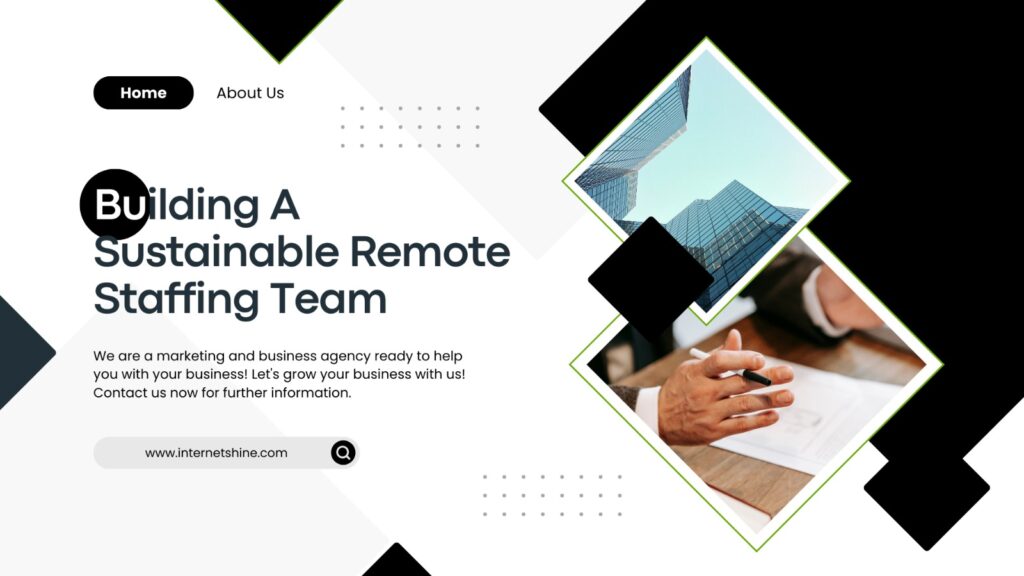In an era where remote work has become the norm rather than the exception, building a sustainable remote staffing team is crucial for any organization aiming to stay competitive and innovative. Here’s a comprehensive guide to help you establish and maintain a robust remote team that thrives in a virtual environment.
1. Define Clear Objectives and Expectations
Establishing clear objectives and expectations is the foundation of any successful remote team. Outline the goals of your remote staffing team and communicate these clearly to all members. This includes:
- Project Deadlines: Set realistic deadlines and ensure everyone understands their role in meeting these targets.
- Performance Metrics: Define key performance indicators (KPIs) that align with your business goals.
- Communication Protocols: Decide on the preferred communication channels and frequency of updates.
2. Invest in the Right Tools
The success of a remote team heavily relies on the tools and technologies at their disposal. Invest in reliable and efficient tools that facilitate seamless communication, collaboration, and productivity. Essential tools include:
- Communication Platforms: Slack, Microsoft Teams, or Zoom for regular check-ins and meetings.
- Project Management Software: Trello, Asana, or Monday.com to track progress and manage tasks.
- Document Collaboration: Google Workspace or Microsoft Office 365 for sharing and co-editing documents.
3. Prioritize Effective Communication
In a remote setting, effective communication is key to ensuring that team members stay connected and informed. Encourage open and transparent communication by:
- Regular Meetings: Schedule regular team meetings to discuss progress, address concerns, and foster team cohesion.
- One-on-One Check-Ins: Conduct individual check-ins to understand each team member’s challenges and provide personalized support.
- Clear Documentation: Maintain detailed documentation of processes, decisions, and project updates accessible to all team members.
4. Foster a Collaborative Culture
Building a strong team culture is crucial for remote teams. Encourage collaboration and team bonding through:
- Virtual Team Building Activities: Organize virtual coffee breaks, game sessions, or team-building exercises to strengthen relationships.
- Recognition and Rewards: Acknowledge and reward team members’ achievements to boost morale and motivation.
- Feedback Mechanisms: Implement regular feedback loops to allow team members to voice their opinions and suggestions.
5. Focus on Work-Life Balance
Remote work can blur the lines between personal and professional life. Promote a healthy work-life balance by:
- Flexible Work Hours: Allow team members to choose their work hours, provided they meet their deadlines and attend necessary meetings.
- Encouraging Breaks: Remind team members to take regular breaks to avoid burnout.
- Mental Health Support: Offer resources and support for mental health and well-being.
6. Hire the Right Talent
Building a sustainable remote team starts with hiring the right people. Look for candidates who:
- Are Self-Motivated: Remote work requires a high level of self-discipline and motivation.
- Have Strong Communication Skills: The ability to communicate effectively is crucial in a remote setting.
- Are Tech-Savvy: Ensure candidates are comfortable using digital tools and platforms.
7. Provide Ongoing Training and Development
Investing in the continuous development of your remote team is vital for long-term success. Offer opportunities for:
- Skill Development: Provide access to online courses, webinars, and workshops to help team members enhance their skills.
- Career Advancement: Create clear pathways for career growth within the organization.
- Mentorship Programs: Pair team members with mentors to guide them and provide support.
8. Measure and Improve
Regularly evaluate the performance and effectiveness of your remote team. Use the data gathered to make informed decisions and improvements. Key areas to measure include:
- Productivity Levels: Track project completion rates and overall productivity.
- Employee Satisfaction: Conduct surveys to gauge team members’ satisfaction and well-being.
- Communication Efficiency: Assess the effectiveness of your communication channels and make adjustments as needed.
Conclusion
Building a sustainable remote staffing team is a multifaceted process that requires clear objectives, the right tools, effective communication, a collaborative culture, work-life balance, the right talent, ongoing training, and continuous improvement. By focusing on these key areas, you can create a remote team that not only meets your business goals but also thrives in a virtual work environment.
